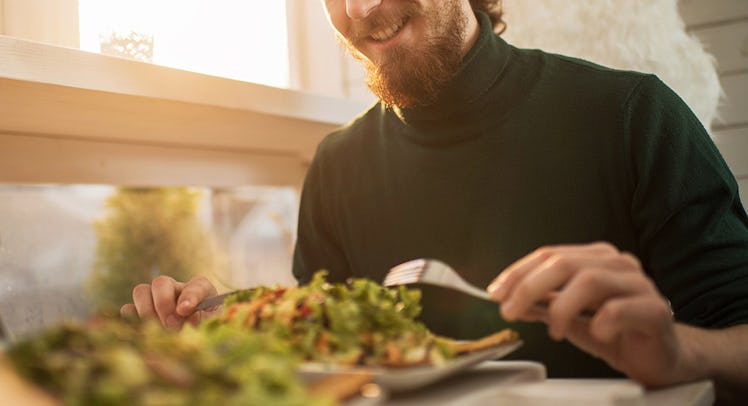Insecure Men Won’t Order Vegetables In Front Of Their Friends
Toxic masculinity may taste a lot like meat, new research warns.

Men are afraid to order vegetarian food in front of their buddies out of fear that they will get roasted even worse than the pork they didn’t want in the first place, new research reveals. The findings, presented at the Royal Geographical Society conference in the UK (for some reason), suggest that younger men may be more vulnerable to masculine, meat-based peer pressure to eat dude food — steer pressure, if you will. However, that can change with a little maturity and guidance, leading to better health outcomes for both the men and the children who look up to them.
“What we have discovered is that many men are interested in eating less meat, they just need social permission to do so—and as more men make vegetarian and vegan choices, that permission is becoming more readily available,” study author Emma Roe, a professor of human geography at the University of Southampton, said in a statement.
The connection between meat and manliness is well documented. Men are more likely to report eating meat and poultry compared to women and women are more likely to report eating fruits and vegetables, according to one study of over 14,000 people. Other figures suggest that nearly 80 percent of vegans in America are women. Some men even felt that eating meat was soothing following scenarios where their masculinity was threatened, one study found.
Yet little research has looked at how men’s relationships with each other influence this. To get a better idea of this, Roe and her team followed 22 British men for a year and documented their food ordering habits for a year. The results, which are preliminary and have yet to be peer reviewed or published in a journal, showed that even when men did not like the taste of meat, had difficulty digesting, or had been instructed by a doctor to reduce consumption, men still struggled to order the vegetarian and vegan options when they were with other men.
‘A man in his late twenties called himself a vegetarian, yet found it awkward not to join friends in a bacon sandwich after playing football on a Sunday, because that is what they did together after football,” Roe told the Daily Mail.
Unfortunately, men’s health takes a health hit from this. Meat protein is linked with an increased risk of heart disease, whereas protein from nuts and seeds is good for heart health. Men suffer from heart disease more than women for a number of reasons like hormonal factors like testosterone, but there’s evidence that lifestyle factors play a role. Still, Roe’s study was not all bad. At one point they divided men into groups based on their diets and encouraged them to make and share vegetarian and vegan meals with each other. Participants appreciated this across the board, noting that this helped to have these choices normalized. Men might outgrow this meaty masculinity eventually as well. Older men were more likely to avoid meat despite social pressures, mostly because they had more trouble digesting it. And an increasing amount of men over 40 are taking up veganism and competitive sporting events like marathons, another survey found.
This shift is not only good for men but the planet and their children’s future. Animal farming currently takes up 83 percent of the world’s agricultural land, yet delivers only 18 percent of our calories, and accounts for 14 percent of current global greenhouse gas emissions, Roe and her colleagues note. (It’s worse for the environment than driving a Hummer.) Men eating less meat is crucial for a more sustainable future food supply, and if their buddies still want to bust their balls over that, maybe they should grow up.
This article was originally published on